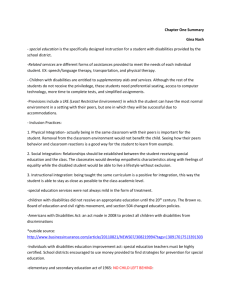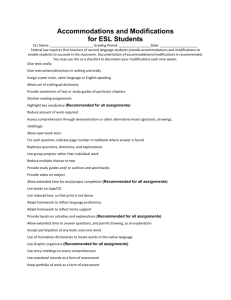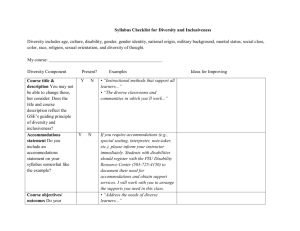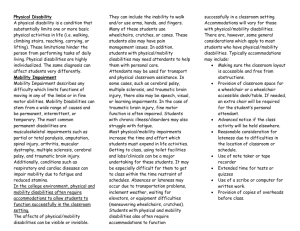Teaching Students with Physical Disabilities
advertisement
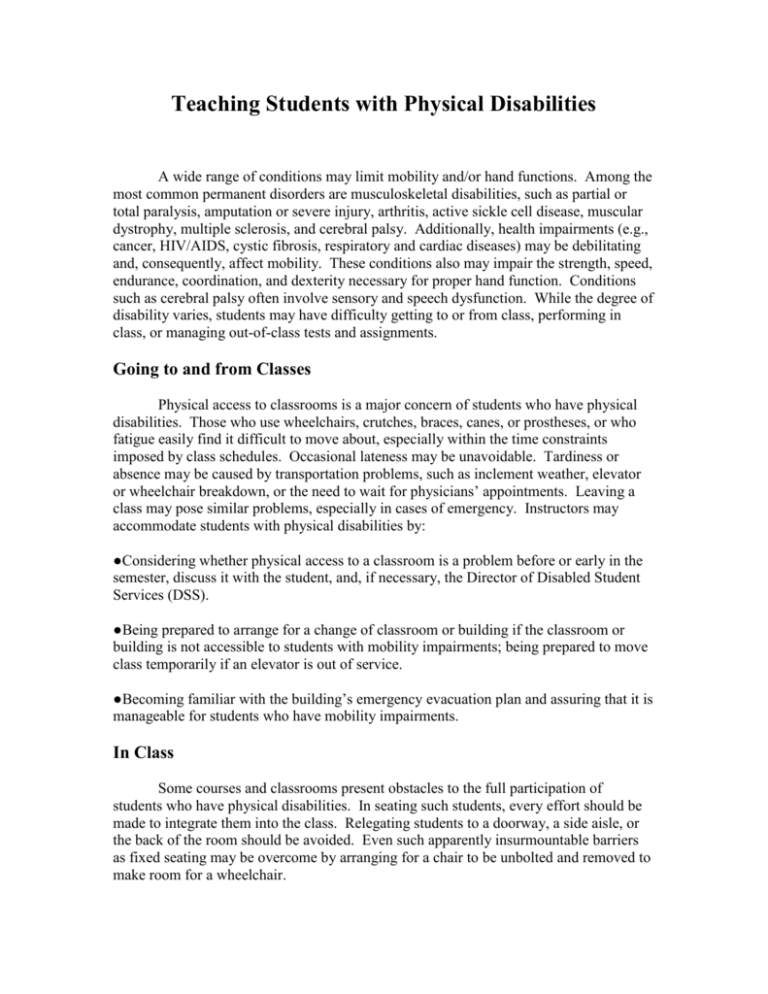
Teaching Students with Physical Disabilities A wide range of conditions may limit mobility and/or hand functions. Among the most common permanent disorders are musculoskeletal disabilities, such as partial or total paralysis, amputation or severe injury, arthritis, active sickle cell disease, muscular dystrophy, multiple sclerosis, and cerebral palsy. Additionally, health impairments (e.g., cancer, HIV/AIDS, cystic fibrosis, respiratory and cardiac diseases) may be debilitating and, consequently, affect mobility. These conditions also may impair the strength, speed, endurance, coordination, and dexterity necessary for proper hand function. Conditions such as cerebral palsy often involve sensory and speech dysfunction. While the degree of disability varies, students may have difficulty getting to or from class, performing in class, or managing out-of-class tests and assignments. Going to and from Classes Physical access to classrooms is a major concern of students who have physical disabilities. Those who use wheelchairs, crutches, braces, canes, or prostheses, or who fatigue easily find it difficult to move about, especially within the time constraints imposed by class schedules. Occasional lateness may be unavoidable. Tardiness or absence may be caused by transportation problems, such as inclement weather, elevator or wheelchair breakdown, or the need to wait for physicians’ appointments. Leaving a class may pose similar problems, especially in cases of emergency. Instructors may accommodate students with physical disabilities by: ●Considering whether physical access to a classroom is a problem before or early in the semester, discuss it with the student, and, if necessary, the Director of Disabled Student Services (DSS). ●Being prepared to arrange for a change of classroom or building if the classroom or building is not accessible to students with mobility impairments; being prepared to move class temporarily if an elevator is out of service. ●Becoming familiar with the building’s emergency evacuation plan and assuring that it is manageable for students who have mobility impairments. In Class Some courses and classrooms present obstacles to the full participation of students who have physical disabilities. In seating such students, every effort should be made to integrate them into the class. Relegating students to a doorway, a side aisle, or the back of the room should be avoided. Even such apparently insurmountable barriers as fixed seating may be overcome by arranging for a chair to be unbolted and removed to make room for a wheelchair. Laboratory stations that are too high for wheelchair users to reach or transfer to, or that have insufficient under-counter knee clearance, may be modified or replaced by portable stations. Without such accommodations, the student may need the assistance of a personal assistance to perform the activities in a laboratory. Students with hand-function limitations may have difficulties both in the laboratory and in the classroom, taking notes, completing in-class writing assignments, and taking written tests. The instructor should be prepared to utilize accommodations like the following: ●Permitting the use of a notetaker or tape recorder. ●Teaming the student with a laboratory partner or assistant. (Note: Educational assistants can be provided by the DSS.) ●Allowing in-class written assignments to be completed out of class with the use of a scribe or other appropriate aid. DSS can administer oral or taped tests, or will provide space and supervision for extended testing time. DSS also is available for alternative testing arrangements. Out-of-Class Assignments For students who have mobility impairments or hand-function impairments, using the library for reading or research assignments may present obstacles. The student may have to arrange with library personnel for access to card catalogs, bookshelves, microfiche, and other equipment. Because the completion of required work may be delayed, the extension of deadlines and the use of “Incomplete” grades may be appropriate. Off-campus assignments and fieldwork may pose similar problems of access to resources. Instructors should consider such accommodations as advance notice to students who rely on special transportation, the extension of deadlines, alternative assignments, and the use of “Incompletes.”
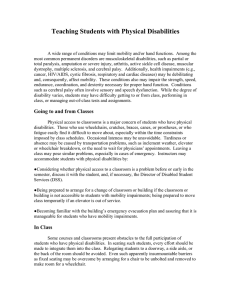

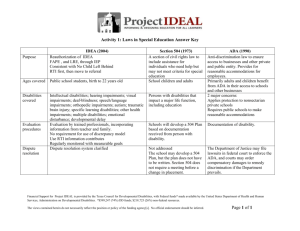


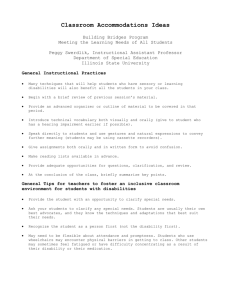

![Syllabus [Word]](http://s3.studylib.net/store/data/006967311_1-8dc868a12812e520f131dbbe02cc269a-300x300.png)
